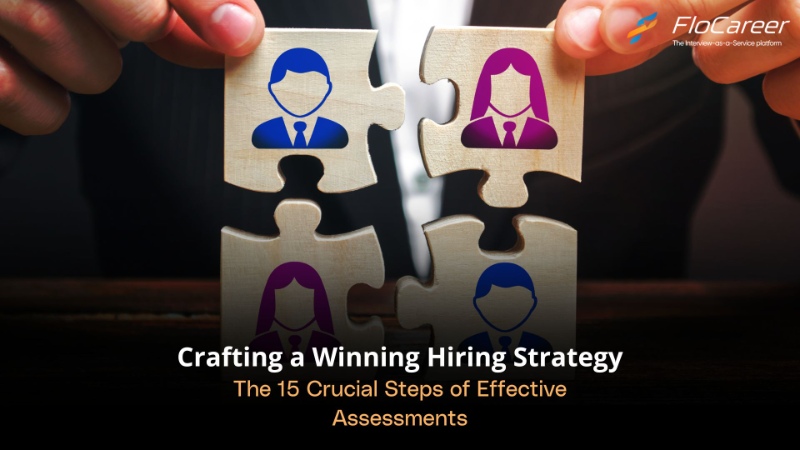Crafting a Winning Hiring Strategy: The 15 Crucial Steps of Effective Assessments
Do you know what is the most difficult job in hiring? Is it taking the interview, shortlisting CVs, or conducting a skill assessment test? Some would argue that it is the entire assessment for hiring. In any hiring process, the most critical factor influencing the decision is the final assessment. This crucial step must be accurate and insightful. But why are we discussing this here? What can a simple tool do to ensure that each hiring assessment is accurate and aligns with the organizational goal? Let’s delve deep into this article.

Benefits of Using Assessments in the Hiring Process
Research reveals that companies utilizing pre-employment assessments experience a 35% reduction in hiring costs, a crucial factor in reducing overall recruitment expenses. These tools help identify individuals with top-notch mental aptitude, excellent behavior traits, and innovative thinking skills. Another study indicates a 27% lower turnover rate in the first year of employment when assessments are part of the hiring process, showcasing their role in retaining employees. Additionally, well-designed assessments can reduce unconscious bias in hiring decisions by 25%, fostering diversity and inclusion.
Strategies for Maximizing ROI with Assessments:
Choose the Right Assessments:
Selecting the appropriate assessments for different candidates can significantly reduce time to hire. There are three main types of assessments – Cognitive, Work Simulation, and Personality – each tailored to the candidate’s profile.
Identify Job Performance and Culture Fit:
Assess if candidates align with the company's culture and work well within the team. Cultural fit plays a crucial role in the long-term success of an employee within an organization.
Understanding Candidate’s Behavior:
Employ personality trait assessments to comprehend the unique behavioral traits of each candidate. This information is invaluable for making onboarding decisions.
Assess Leadership Quality and Long-Term Goals:
Evaluate candidates for leadership potential and long-term commitment to the company. Use personality assessments for succession planning and identifying future leaders.
Consider the Budget Before Choosing Assessment Tools:
Assess the organization's needs and budget constraints before investing in assessment tools. For smaller enterprises, interview as a service might be a more suitable option.
Follow Up and Calibrate with the Team:
Involve the entire team in the hiring decision process to build ownership and accountability. Calibration ensures the hiring process aligns with the team’s culture and requirements.
Know When to “Knock Out” Candidates Based on Assessment Results:
Seek expert input to analyze assessment reports, especially for personality tests and technical assessments. This ensures accurate feedback and informed hiring decisions.
Incorporate Feedback Mechanisms:
Establish a system for collecting feedback from various stakeholders involved in the hiring process. This iterative approach helps refine assessments over time.
Continuous Training on Assessment Interpretation:
Regularly train hiring managers on interpreting assessment results. This ongoing education ensures accurate evaluations and informed decision-making.
Customize Assessments for Specific Roles:
Tailor assessments to the unique requirements of different roles within the organization. This customization enhances the relevance and effectiveness of assessments.
Leverage Technology for Remote Assessments:
Embrace technology to facilitate remote assessments, ensuring flexibility in the hiring process, especially in the era of remote work.
Utilize Predictive Analytics:
Implement predictive analytics to analyze past assessment data and identify patterns that correlate with successful hires. This data-driven approach enhances the predictive power of assessments.
Integrate Assessments into Performance Reviews:
Extend the use of assessments beyond the hiring process. Integrate them into performance reviews to gauge ongoing employee development and growth.
Benchmark Assessments Against Industry Standards:
Regularly benchmark assessments against industry standards to ensure they remain relevant and aligned with the evolving landscape of skills and competencies.
Explore Outsourcing Options for Unbiased Interviews:
Consider outsourcing interviews with Flocareer to ensure unbiased assessments. Flocareer's interview outsourcing services streamline the process, combining advanced technology with expertise for impactful hiring decisions.
In the ever-evolving landscape of talent acquisition, the role of assessments stands out as a pivotal force in ensuring a streamlined and effective hiring process. The journey through these 15 strategies illuminates the path for recruiters, providing a comprehensive guide to harnessing the full potential of assessments. From the initial selection of appropriate tools to the ongoing refinement of strategies, recruiters are equipped with a roadmap for success in identifying and onboarding top-tier talent.
As organizations strive for excellence in their recruitment endeavors, the integration of assessments into the broader talent management strategy becomes crucial. These strategies not only enhance the accuracy of candidate evaluations but also contribute to the overall success and growth of the organization. The ability to predict future success based on current assessments adds a forward-looking dimension to the hiring process, ensuring that the recruited talent aligns seamlessly with the long-term goals and objectives of the company.
For those seeking a holistic approach to hiring, Flocareer offers a unique solution through interview outsourcing. By outsourcing interviews, organizations can introduce an additional layer of objectivity and efficiency to their hiring endeavors. Flocareer's services bring a fresh perspective, reducing biases and ensuring a fair evaluation of candidates. Embracing assessments as dynamic instruments, recruiters can navigate the intricacies of the talent landscape with confidence, knowing they have a robust and strategic approach to identify, evaluate, and secure the best-fit candidates for their organization's success.
Check out our latest blog on Evaluating Decision Making Skills


